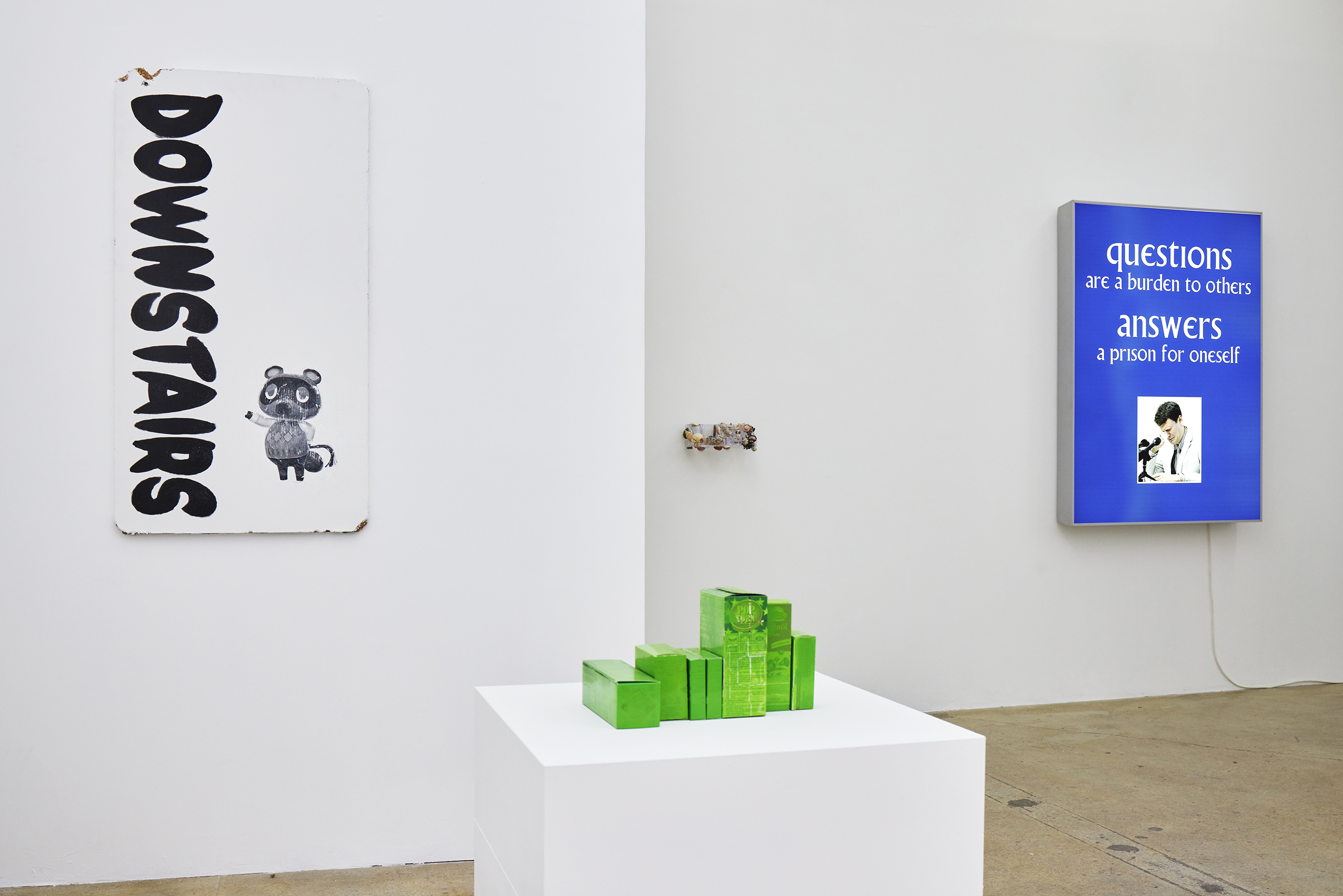Shifters
17.10.22–05.11.22
Studiolo, Paris (FR)
Curation: Sentiment
Text:
Jennifer Teets
Photo: Jean Vincent Simonet


Groupshow: Kevin Desbouis, Céline Mathieu, Dominic Michel, Philémon Otth, Hanna Rochereau, Angharad Williams, Arnaud Wohlhauser
One early morning en route to Morocco I learned that my mentor had died. When writing on the atmosphere and new climatic regimes he would point to what sort of breathing space is conducive to civilized life —or not. Envelops, spheres, skins, ambiances, were things that he was trying to dig out of totally inaccessible infrastructures. These are the real ‘conditions of possibility,’ he would write to me in our epistolary exchanges. “You are on life support, it’s fragile, it’s technical, it’s public, it’s political, it could break down—it is breaking down—it’s being fixed, you are not too confident of those who fix it.”
The new age soundtrack in the downstairs waiting hall at Orly does little to ease the shock. I stroll past carousels of perfume stock, to get distracted and waste time. The overall vibe gives me nothing to hold onto, remaining as transitory as its location. “Eternity” “Fahrenheit” “Poison” “Knowing” “Ma liberté”. I embalm myself. The word perfume comes from the Latin word “fumus” meaning “smoke” probably related to incense burned into the air in the moment of prayer. With the invention of toilet spray waters, came restoration, from energies lost in business, social and domestic situations. One of the first perfumes in Europe, “Hungary Water” was named after the so-called Queen of Hungary who commanded a court alchemist to make it for her headaches. But, the legend says she never existed, she was invented. Louis XIV bathed once every 4–5 months, but was very fond of being rubbed with very strong scented substances and rinsing his hands in wine spirit. The idea of bathing was more erotic than hygienic. Spirits were also used to ward off the smell of feces and other bodily odors, and especially employed against Black Death and the plague. Modern airplane fumes indeed smell like shit. A man buys a bottle of discounted Paco Rabanne and sprays it into the void. A woman profusely coughs.
Perfume is transitory, like memory or fiction. Stories are dissipated histories, clearly there is no beginning or ending. In the midst of languished prodding, I dream of the places where I can go, and this text too. I press my inner self with imaginary locales, taking everything with me in a rucksack. I remember the poem Anywhere of the World (N'importe où hors du monde) by Baudelaire as a reflection on soul searching and reverie. The space of shifting consciousness, to displace, to detract, to fly and get away from this modern headache. “Life is a hospital where every patient is obsessed by the desire of changing beds. One would like to suffer opposite the stove, another is sure he would get well beside the window,” reads the opening line. Baudelaire often imagined the biggest act to elude the modern spell. A wayfarer* is a person on a journey. Wayfarers usually take shelter in hospitals in order to recharge for the next part of the journey, to get restored. I always imagine lightly perfumed waters in tin basins next to sick people’s beds, something I saw in the movies. The poet’s sickened nightmare of depression and malaise suggest that men and women have stopped moving on. There is nothing to find in this world, no destination to reach. The plight of the poet is like any exiled, suffering, or mistreated person. “To me it seems always it would be well for me to be somewhere I am not, and the question of moving is one that my soul and I discuss endlessly.”
I am welcomed in Fez with fragrant mint tea, a well known gesture of hospitality. I am here to see an exhibition that is restaged 20 years later. Teenagers flip through photographs of their artist mentors standing in the same angle, next to their artworks captured 20 years earlier. There is an air of familiarity and dejavu.
Shopping at the old medina I started to ask myself about whether the wool blanket I just bought is authentic. Afterall, 75 percent of wool is imported from New Zealand. Was the loom I saw in the rear a prop? My Norwegian friend shouts, “I am from Norway and I know wool!” Toting my blanket, I feel slightly embarrassed.
There is a mix of dust, wet animal skin, burning tires, and anomaly permeating the air. In this mobile life, one is frequently wafted upon.
I smear my nose in tiger balm to ward off the stench and climb the steep steps to the rooftop of the Chouara tanneries. The sheer size is truly remarkable. I peer down into large stone mosaic vats filled with different colored dyes and white liquids, which I learn are composed of cow urine, pigeon feces, quicklime, salt, and water. But they forgot to mention chromium 3 which is used for leather treatment and is lethal. Men stand thigh-deep in murky water, sloshing hides back and forth. These liquids are used to soften the tough skin. I contemplate the hides of cows, sheep, goats, and camels wondering about their origin, if not the effects on the skin of men.
“Atmosphère,atmosphère, est-ce que j’ai une gueule d’atmosphère?” (‘Atmosphere, atmosphere, do I look like an atmosphere?’). I ruminate on my mentor’s powerful opening and take a gasp. The proletarian lung is transcorporeal, the river is transcorporeal. The body is never rigidly enclosed, never a protected entity. It displaces and shifts in the infrastructures of our times, like a wayfarer on the journey.
* Wayfarer is a traveler especially on foot, and could be likened to a "Shifter"; this text explores their interrelationship exploring transitory states, feelings, accumulations and places. Jennifer Teets is an American curator and writer based in Paris.